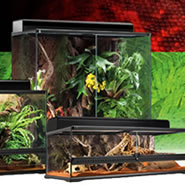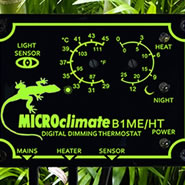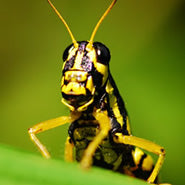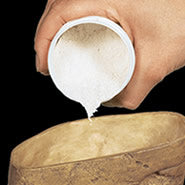Free Delivery
On order over £79*



Housing: a glass terrarium of at least 450x450x600mm

Heating: ambient air temperature of 75-80oF

UVB Lighting: 5.0 UVB fluorescent tube or compact lamp

Diet: carnivorous diet of insects

Decoration: damp substrate to raise humidity levels
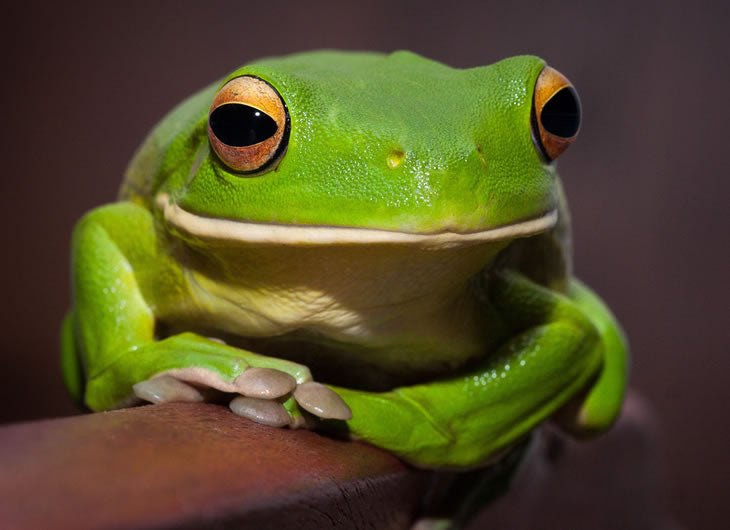
White-lipped tree frogs do well with a glass terrarium as their enclosure. This is because glass is great at allowing heat to escape ensuring that the enclosure stays cool enough. Other enclosures such as wooden vivariums are far too efficient at retaining heat.
The white-lipped tree frog's vivarium should be at least 450mm in length and 600mm in height. There are 2 main reasons for this; firstly the white-lipped tree frog is going to grow to around 5" so they need a space large enough for them to move around in. Secondly they are an arboreal frog so they need an enclosure with enough height for them to climb.
White-lipped tree frogs require a near constant air temperature of 75oF. This is best achieved by sticking a large heatmat on one side of the glass enclosure. This heatmat is regulated using a thermostat to make sure the temperature stays constant.
As the glass is only being heated on one side this also creates a small temperature gradient within the enclosure allowing the frog to warm itself up or move away to cool down.
If the enclosure is not able to get up to temperature with the heat mat alone a small basking bulb may be implemented in the canopy as long as the temperatures do not exceed 75-80oF.
White-lipped tree frogs are arboreal frogs from Australia. Animals that inhabit jungle regions do have some natural cover but still receive a fair amount of UV. Their UVB source should reflect this. In this kind of enclosure lights are generally held in a canopy above the mesh ceiling. In this canopy you can either implement a 5-6% UV tube or the equivalent compact light.
White-lipped tree frogs require UVB in order to synthesise vitamin D3 inside their skin. The vitamin D3 helps the frog to absorb calcium which crucial for bone structure and growth. This is why reptiles can suffer from metabolic bone disease (MBD) when not provided with adequate UVB.
It is recommended that t5 tubes are replaced every 9 months and compact lamps are replaced every 6 months.
White-lipped tree frogs should be kept on a slightly moist substrate to increase the humidity inside the vivarium. Whilst any loose substrate has the potential to be accidentally swallowed, we have found this to not be a problem with coarse orchid bark and that is what we keep our white-lipped tree frogs on. It is also very easy to clean. If the humidity is not high enough with just this substrate we would recommend adding a small amount of moss to the enclosure.
White-lipped tree frogs are an arboreal frog and they do like to climb on top of things to survey their surroundings. The terrarium should be decorated with various pieces of wood or vine to enable them to do this.
The tree frogs vivarium can be decorated with artificial plants for a more natural look. Natural wood ornaments look very effective and also provide further perches for the frogs. Trailing plants are very good at disguising electrical wires and equipment, as well as providing cover for young amphibians.
White-lipped tree frogs are carnivorous and have a diet consisting of mainly livefoods. The core of the livefood diet should be high in protein and relatively easy to digest. We have found that brown crickets are the most readily accepted, but you can also use black crickets or locusts (hoppers). On occasion, for variation you can offer other bugs such as mealworms, waxworms or calciworms.
The vivarium should be misted with water every morning to provide hydration. A water bowl may also be introduced as a source of freshwater.
To provide the white-lipped tree frog with optimal nutrition and to keep them in the best of health, they will require diet supplementation in the form of calcium, vitamins and minerals. These are most commonly available as powders
Any livefood for the gocko should be 'gut-loaded' with an insect food. This basically involves feeding the livefood a nutrient rich diet before they are fed to the white-lipped tree frog. Our livefood is delivered to you already gut-loaded but this should be continued at home.
Sign up to the Reptile Centre newsletter so you don't miss out on all the latest offers and guides to give your pet the best they deserve


